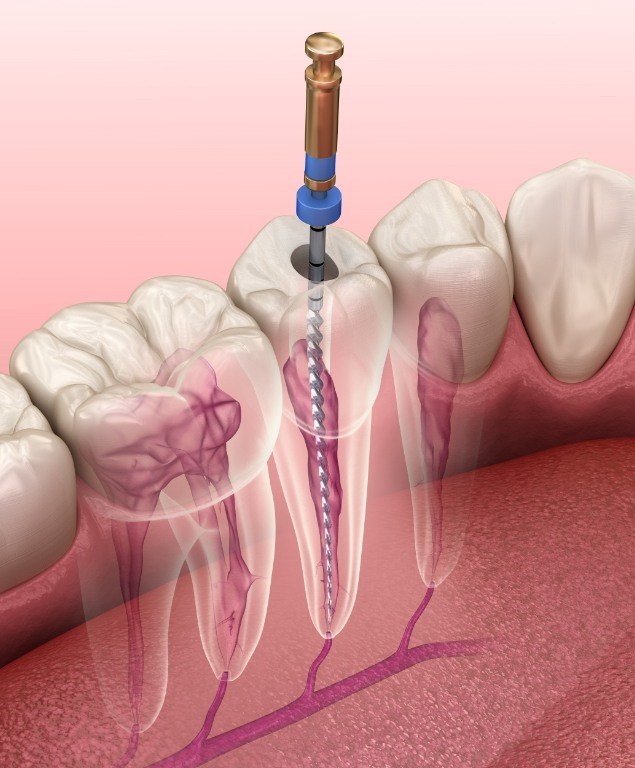Root Canal Treatment Cambridge
Easing Your Pain & Preserving Your Tooth
Root canal treatment is needed when the nerve of a tooth is affected by decay or infection. In order to save the tooth, the pulp (the living tissue inside the tooth), nerves, bacteria, and any decay are removed, and the resulting space is filled with special, medicated, dental materials, which restore the tooth to its full function. Having a root canal done on a tooth is the treatment of choice to save a tooth that otherwise would die and have to be removed. Many patients believe that removing a tooth that has problems is the solution, but what is not realized is that extracting (pulling) a tooth will ultimately be more costly and cause significant problems for adjacent teeth. At our dental office, root canal treatment in Cambridge is highly successful and the results usually last a lifetime, although on occasion, a tooth will have to be retreated due to new infections.
Ideal Candidates for Root Canal Treatment

Signs and symptoms for possible root canal treatment:
- An abscess (or pimple) on the gums.
- Sensitivity to hot and cold.
- Severe toothache pain.
- Sometimes no symptoms are present.
- Swelling and/or tenderness.
Reasons for a root canal:
- Decay has reached the tooth pulp (the living tissue inside the tooth).
- Infection or abscess have developed inside the tooth or at the root tip.
- Injury or trauma to the tooth.
The Process of Getting a Root Canal

A root canal procedure requires one or more appointments and can be performed by a dentist or endodontist (a root canal specialist). While the tooth is numb, a rubber dam (a sheet of rubber) will be placed around the tooth to keep it dry and free of saliva. An access opening is made on top of the tooth and a series of root canal files are placed into the opening, one at a time, removing the pulp, nerve tissue, and bacteria.
If tooth decay is present, it will also be removed with special dental instruments. Once the tooth is thoroughly cleaned, it will be sealed with either a permanent filling or, if additional appointments are needed, a temporary filling will be placed. At the next appointment, usually a week later, the roots and the inside cavity of the tooth will be filled and sealed with special dental materials. A filling will be placed to cover the opening on top of the tooth. In addition, all teeth that have root canal treatment should have a dental crown (cap) placed. This will protect the tooth and prevent it from breaking and restore it to its full function. After treatment, your tooth may still be sensitive, but this will subside as the inflammation diminishes and the tooth has healed. You will be given care instructions after each appointment. To aid in the life of your root canal results, patients should practice good oral hygiene and have regular dental visits.
Understanding the Cost of Root Canals

Because each root canal is as unique as each individual patient, it is impossible to give you an accurate price quote until your tooth has been examined by your dentist. It is important to understand the many factors that go into determining the final price of your treatment, including the difficulty of the procedure and any additional services that may be needed. For a more accurate quote, please schedule a consultation with us today. To learn more about how we determine the cost of your care, please keep reading.
Factors That Can Affect Root Canal Cost

Unfortunately, it is difficult to determine the exact cost of a root canal until Dr. Bhatt or Dr. Todd have had the opportunity to assess the tooth or teeth in question in person. There are several important factors that could influence the final amount, including:
- The type and location of the tooth or teeth.
- The overall difficulty of the root canal, and whether a specialist will need to assist with your treatment.
- If you require any additional services, such as a new dental crown.
Is it Cheaper to Pull My Tooth?

Often, patients can be tempted to skip the root canal altogether and just have their tooth extracted instead. But while yes, tooth extractions can be more affordable up front, it’s important to consider the long-term costs of removing a permanent tooth. Your bite can become negatively impacted as your remaining teeth shift out of place, which frequently results in pain and difficulty eating.
To prevent this from occurring, Dr. Bhatt and Dr. Todd recommend replacing your extracted tooth with a dental bridge or dental implant, both of which will incur separate costs. Ultimately, it can be more cost-effective to save your natural tooth with a root canal than replace it later.
No matter what you decide, be sure to act quickly. The longer you wait to treat an infected tooth, the more likely you will need to have it extracted either way.
Does Dental Insurance Cover Root Canals?

Because a root canal is considered a major procedure, many dental insurance plans will cover anywhere from 50% to 80% of the cost after the deductible has been met. However, please be aware that every plan is different, which is why it’s important to confirm your coverage with your insurance company first. Our team is happy to help with this process too!
Other Options for Making Root Canal Treatment Affordable

In addition to proudly accepting all PPO dental insurance plans, Harbor Dental Center welcomes financing from our preferred third-party lender, CareCredit. These flexible, low-to-no-interest programs allow you to break up the cost of your root canal treatment into more affordable monthly payments that may be better suited to your budget.
We are also proud to have our own in-house dental savings plan which provides a 15% savings on all services we offer.
At Harbor Dental Center, Dr. Bhatt, Dr. Todd and the team are ready to assist you with your root canal, including helping you navigate the cost. For more information or to schedule treatment, please call us today!
Root Canal FAQs
Can Root Canals Make You Sick?
There is no scientific evidence that supports the claim that root canals can lead to illness. The myth that it does stems from research conducted back in the 1920s, but it was poorly conducted. Plus, the findings have been disproved on several occasions. That’s why we always recommend bringing any questions or concerns you have to our emergency dentist. They’d be happy to provide further insight and answers so you feel completely confident moving forward with your treatment plan.
Why Do I Need a Root Canal If My Tooth Doesn’t Hurt?
Simply put, pain isn’t the only symptom of a badly decayed or damaged tooth. In fact, if the infection is left alone, it can kill the nerve, rendering it unable to register pain. So, it’s important that you get the restorative care you need sooner rather than later, even if the situation doesn’t seem urgent.
Can Root Canals Be Prevented?
Usually, yes! The easiest way to reduce your chances of needing a root canal is by prioritizing preventive care, like brushing, flossing, and rinsing with mouthwash consistently. It’s also important that you come to our Cambridge dental office every six months for an exam so we can catch oral health problems that do surface in the early stages.
What Happens If I Don’t Get a Root Canal?
If you struggle with dental anxiety, you have a fear of needles, or you’re worried about the cost, you might be tempted to take the “wait and see” approach. However, the longer you wait to get the care you need, the more time the infection has to progress. As we mentioned above, this can lead to several problems, including the nerve of your tooth dying. Eventually, there will even come a point where saving your tooth is no longer possible. For all of these reasons, we recommend scheduling the necessary restorative care quickly.
I Am Scared of the Dentist. What Should I Do?
Dental anxiety is more common than you may think, and it’s absolutely nothing to be ashamed of. Whether yours stems from a bad experience at a different office or because the sights, sounds, and smells of the practice put you on edge, let us know! From there, we can determine how to give you the comfortable, positive experience you deserve, like adding sedation dentistry to your treatment plan.
Can I Eat Before My Root Canal?
If you are being sedated for the procedure, then we will likely recommend fasting beforehand. Otherwise, you can eat a healthy, well-balanced meal that’s low in added sugar. Just make sure to brush and floss your teeth when you’re done!
